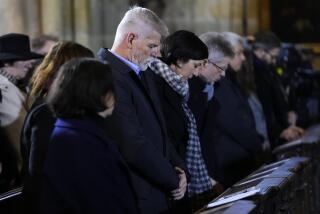Czechoslovakia’s Sliver of Dawn
- Share via
Twenty-one years ago, Milos Jakes was among the small band of hard-line Czechoslovakian Communists who hid in the Soviet Union’s embassy in Prague as Red Army tanks rolled into the city to crush the liberalization movement headed by Alexander Dubcek. Jakes and other party reactionaries soon emerged to endorse the invasion by Soviet and other Warsaw Pact armies, to take power and to begin a purge of the reformers. Dubcek in turn became a nonperson, exiled to a menial forest service job in Bratislava under close secret police scrutiny. This week, after eight tumultuous days of demonstrations across Czechoslovakia, Dubcek is again being hailed by hundreds of thousands in Prague, while Jakes and others of the infamous generation of 1968 appear to be on their way out.
It is a remarkable turnaround for a people that, so often betrayed and disappointed, had sunk into an understandable political passivity, and for a leadership that confidently believed it could ride out the storm of political change howling across Eastern Europe. On Friday of last week the regime ordered its police to brutally suppress a demonstration by 50,000 or so students. Within days it was forced to apologize for its use of excessive force. Within a few days more it found itself confronting 300,000 or more protesters, this time from all walks of life. Czechs had learned, as Filipinos, South Koreans, Poles and East Germans had learned, that there is a time to be afraid no longer.
The resignations of Jakes and other members of the Communist Party Politburo and secretariat end a chapter; they do not close the book on repressive rule. Karel Urbanek, the new party leader, comes from the very Politburo that just resigned. How much of a reformer he will prove to be remains to be shown. Czechoslovakia, like East Germany even after the stunning changes it has experienced, is still for now a one-party state, lacking an uncontrolled press, guaranteed civil liberties and other vital hallmarks of a free society. Much, much more is yet to be done.
But there is a clear sense now that a beginning has been made, that change has become an irresistible force. In his talk in Wenceslas Square yesterday, Dubcek asked, “If there once was light, why should there be darkness again?” The horizon begins to show the faint glow of a new dawn. Czechoslovakia’s long night of darkness may at last be ending.
More to Read
Sign up for Essential California
The most important California stories and recommendations in your inbox every morning.
You may occasionally receive promotional content from the Los Angeles Times.













